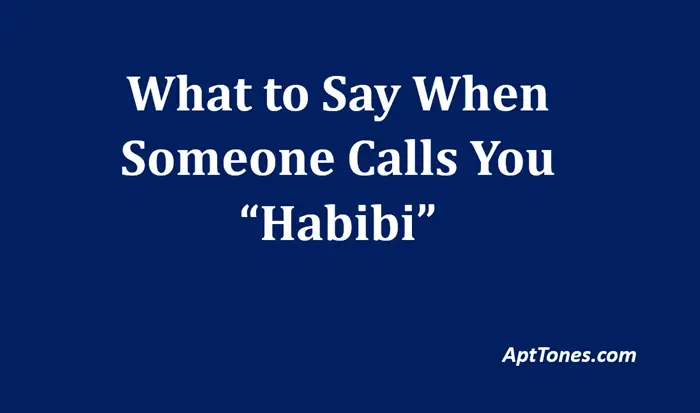Ever been called “Habibi” and wondered how to respond? This Arabic term, meaning “my love” or “my dear,” is often used affectionately between friends, family, and even between strangers in some contexts, showcasing warmth and friendliness.
What to Say When Someone Calls You Habibi
Here are 20 responses to “Habibi” that can help you navigate this cultural nuance with ease, whether you’re aiming to reciprocate the warmth, make a light-hearted comment, or simply acknowledge the gesture in a respectful manner.

1. “And you’re mine, Habibi.”
This response mirrors the affection, creating a mutual sense of warmth and friendship. It’s perfect in situations where you’re comfortable with the person and wish to express reciprocal affection.
2. “Thank you for the kindness, friend.”
Acknowledging the term of endearment with gratitude and addressing the person as a friend is a respectful way to respond. It’s suitable in more formal or less familiar situations where you want to maintain a polite distance.
3. “That’s very sweet of you to say!”
Expressing appreciation for the sentiment without directly using the term can be a great way to respond if you’re unsure about the cultural implications. It’s appropriate in casual interactions where you want to acknowledge the warmth without fully engaging in the cultural context.
4. “Always a pleasure to hear that from you.”
This response indicates that you value the affectionate term coming from the speaker, reinforcing a positive relationship. Use it when you’re familiar with the person and comfortable with the exchange.
5. “Hearing ‘Habibi’ from you always makes my day better.”
Highlighting the positive impact of the term on your day is a heartwarming way to respond, suitable for close relationships or when you want to express how much their words mean to you.
6. “You just brought a smile to my face, thank you.”
Acknowledging that being called “Habibi” made you happy is a gentle and effective way to respond, suitable for any context where you want to convey the joy their gesture has brought you.
7. “I hope I can be as good a friend to you as you are to me.”
This response shifts the focus from the term itself to the value of the friendship, expressing a desire to reciprocate their kindness and affection. It’s ideal for deepening a bond between friends.
8. “Such warmth in your words, I appreciate it.”
Commenting on the warmth conveyed by the term “Habibi” is a respectful way to acknowledge the sentiment, especially in professional or formal settings where personal connections are valued.
9. “Your friendship means a lot to me too.”
Expressing the value you place on the friendship in response to being called “Habibi” is a heartfelt way to reciprocate the sentiment, suitable for close relationships.
10. “Let’s make sure to catch up soon, my friend.”
Using the occasion to propose a catch-up is a proactive way to strengthen the relationship, subtly moving beyond the term’s immediate warmth to action. It’s great for rekindling or maintaining friendships.
11. “I’m lucky to have you in my life.”
Acknowledging the person’s importance in your life as a response to “Habibi” is a touching way to convey your appreciation for the relationship, suitable for close friends or family members.
12. “This just reminded me of our great times together.”
Recalling shared memories in response to “Habibi” can be a nostalgic and affectionate way to connect, ideal for long-standing relationships.
13. “I always feel at home when you call me that.”
Expressing a sense of belonging and comfort in response to “Habibi” deepens the emotional connection, suitable for intimate or familial relationships.
14. “Your good vibes are contagious!”
Complimenting the person’s positive energy in response to “Habibi” is a lighthearted way to reciprocate the warmth, appropriate for both casual and close relationships.
15. “It’s an honor to be your Habibi.”
Acknowledging the term as an honor reflects a deep appreciation for the relationship and the affection shown, suitable for situations where you want to express a profound sense of respect and connection.
16. “You have a way of making people feel special, thank you.”
Praising the person’s ability to make others feel valued in response to “Habibi” is a kind and respectful way to acknowledge their warmth, suitable for all contexts.
17. “I cherish our bond, truly.”
Expressing cherishment of the relationship in response to “Habibi” is a sincere and heartfelt way to reciprocate affection, ideal for close and meaningful relationships.
18. “Let’s keep spreading this positivity around!”
Encouraging the continuation of positive exchanges in response to “Habibi” reflects an optimistic and forward-looking attitude, great for fostering a positive environment.
19. “Your words always lift me up. Thank you.”
Acknowledging the uplifting effect of being called “Habibi” is a genuine way to express how much their support means to you, suitable for any situation where emotional support is valued.
20. “Here’s to more beautiful moments together!”
Looking forward to future interactions in response to “Habibi” is an optimistic and affectionate way to reciprocate, perfect for relationships where you’re excited about what’s to come.
Wrap-up
Each of these responses is crafted to help you navigate the affectionate term “Habibi” with grace, warmth, and respect. Whether you’re deepening a friendship, acknowledging a gesture, or simply expressing gratitude, these replies ensure that you can handle the moment with ease and poise.